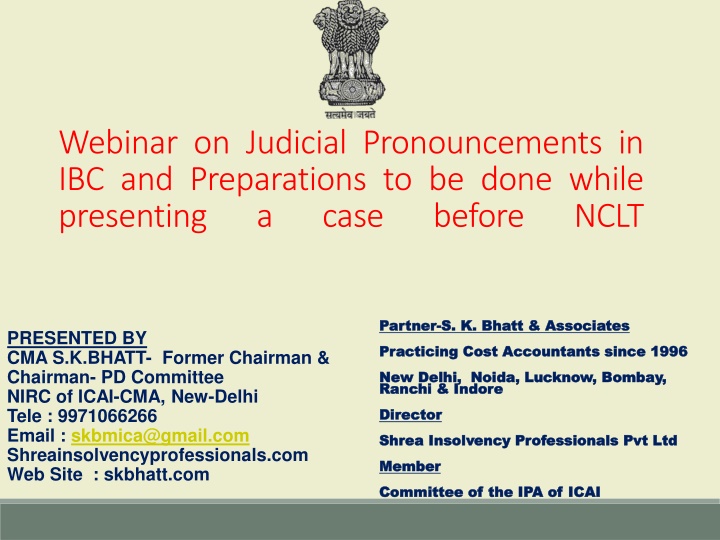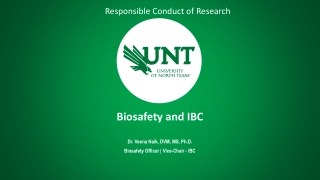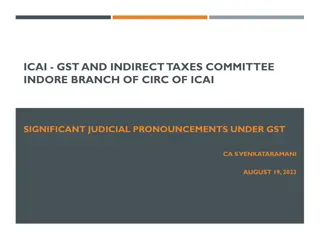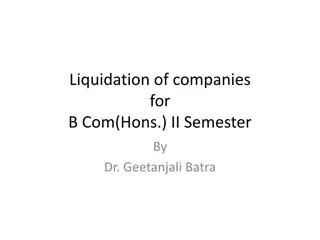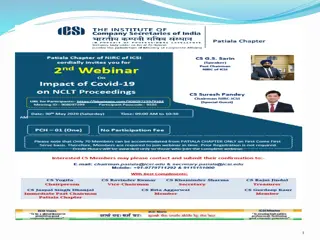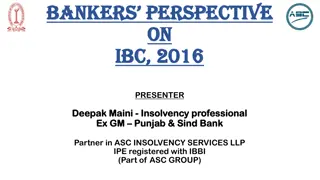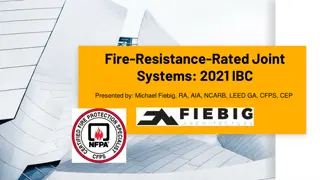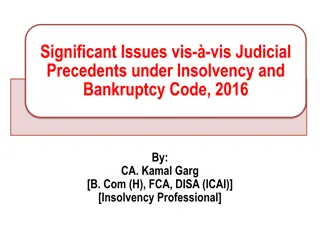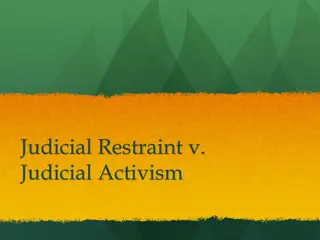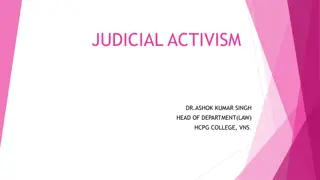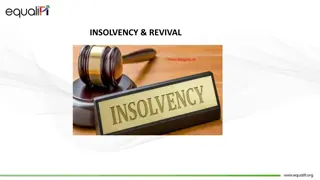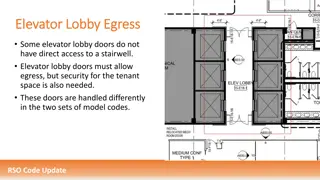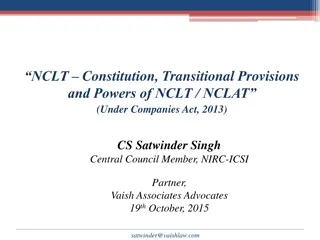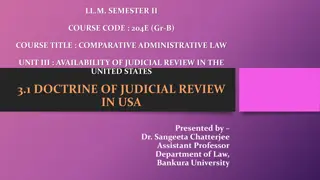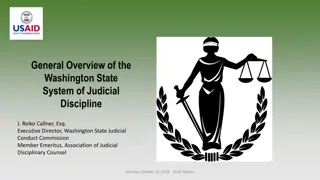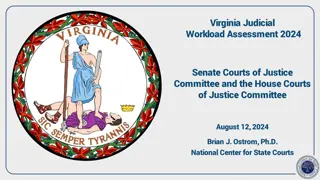Webinar on Judicial Pronouncements in IBC and NCLT Case Presentation
This webinar covers judicial pronouncements in Insolvency and Bankruptcy Code (IBC) cases and essential preparations for presenting a case before the National Company Law Tribunal (NCLT). It includes insights and case discussions regarding debt assignment, related party transactions, and disputes over financial creditor status. The presentation highlights important decisions taken by NCLAT in recent cases.
Download Presentation

Please find below an Image/Link to download the presentation.
The content on the website is provided AS IS for your information and personal use only. It may not be sold, licensed, or shared on other websites without obtaining consent from the author.If you encounter any issues during the download, it is possible that the publisher has removed the file from their server.
You are allowed to download the files provided on this website for personal or commercial use, subject to the condition that they are used lawfully. All files are the property of their respective owners.
The content on the website is provided AS IS for your information and personal use only. It may not be sold, licensed, or shared on other websites without obtaining consent from the author.
E N D
Presentation Transcript
Webinar on Judicial Pronouncements in IBC and Preparations to be done while presenting a case before NCLT Partner Partner- -S. K. Bhatt & Associates S. K. Bhatt & Associates Practicing Cost Accountants since 1996 Practicing Cost Accountants since 1996 New Delhi, Noida, New Delhi, Noida, Lucknow Lucknow, Bombay, Ranchi & Indore Ranchi & Indore Director Director Shrea Shrea Insolvency Professionals Insolvency Professionals Pvt Member Member Committee of the IPA of ICAI Committee of the IPA of ICAI PRESENTED BY CMA S.K.BHATT- Former Chairman & Chairman- PD Committee NIRC of ICAI-CMA, New-Delhi Tele : 9971066266 Email : skbmica@gmail.com Shreainsolvencyprofessionals.com Web Site : skbhatt.com , Bombay, Pvt Ltd Ltd
Case Name : Case Name : Pankaj NCLAT, Delhi Bench Order Dated: 07 NCLAT, Delhi Bench Order Dated: 07- -Aug Pankaj Yadav Yadav, Vs. State Bank of India Ltd. , Vs. State Bank of India Ltd. Aug- -18 18 Brief about the decision: A legal transfer of debt account from a creditor (assignor) to a third party (assignee) provides the rightful ownership to the assignee. The debtassignment is a transfer of debt with all the rights and obligations associated with it from a creditor to a third party, who is assignee The only question requires for determination in this appeal is whether the 1st appellant is a relatedparty or not? The Adjudicating Authority taking into consideration the facts and circumstances of the case observed that meticulous planning was made by the Director of the Corporate Debtor to execute AssignmentDeed with the sole intention to bring down the voting power to the State Bank of India which cannot be regarded as a natural business decision. The Adjudicating Authority also observed that relatedparty cannot suddenly become a non-related party because he just washes off his hands and hands over the paper to other party who had no valid reasons for taking up the assignment of a debt.
There being a dispute as to who is the Financial Creditor, NCLAT has held that the application under Section 7 is not maintainable. Ramesh Kumar Suneja Vs. Brij Mohan Sahni- NCLAT In the earlier application plea was taken that Late Mr. Surinder Mohan Sahni entered into partnership with Mr. Brij Mohan Sahni and after death of Mr. Surinder Mohan Sahni on 2nd October, 2015, partnership between Mr. Surinder Mohan Sahni and Mr. Brij Mohan Sahni came to an end and firm stood dissolved. Mr. Rasik Sahni entered into partnership with Mr. Brij Mohan Sahni on 3rd October, 2015 and the new partnership firm took all the assets and liabilities of the old partnership firm i.e. partnership firm between Mr. Brij Mohan Sahni and Late Mr. Surinder Mohan Sahni. The other living partner cannot take entire assets of the firm at the back of the legal heirs of the deceased partner on the next date. There is no whisper as to how the share of the deceased partner was transferred to the surviving partner and his son just on the next day of the death/ dissolution. How there was transfer of the interest of the deceased partner, has not been made clear. It has not been made clear as to how the applicant new firm incorporated on 03.10.2015 with father and son on the one side took over the entire business including the share/property of the deceased partner
If the principle amount has already been paid and as per agreement no interest was payable, the applications under Section 9 on the basis of claims for entitlement of interest, were not maintainable-Krishna Enterprises Vs. Gammon India Ltd.- NCLAT If the principle amount has already been paid and as per agreement no interest was payable, the applications under Section 9 on the basis of claims for entitlement of interest, were not maintainable. If for delayed payment Appellant(s) claim any interest, it will be open to them to move before a court of competent jurisdiction, but initiation of Corporate Insolvency Resolution Process is not the answer.
Case on advance against Material- M/s. Daya Engineering Works Pvt. Ltd. Vs. M/s. UIC Udyog Ltd.-NCLAT The Appellant- M/s. Daya Engineering Works Pvt. Ltd. invested money with M/s. UIC Udyog Ltd. for supplying of materials. The materials valued Rs. 4,02,33,473/- (Rupees Four Crore Two Lakh Thirty-Three Thousand Four Hundred Seventy-Three Only) were supplied but material of the balance amount Rs. 12,09,443/- (Rupees Twelve Lakh Nine Thousand Four Hundred Forty-Three Only) was not supplies. According to the Appellant, the Respondent is liable to pay back the balance amount of Rs. 12,09,443/- with @ 24% interest. With the aforesaid claim, the Appellant filed an application under Section 9 of the Insolvency and Bankruptcy Code, 2016 . The Adjudicating Authority (National Company Law Tribunal), Kolkata Bench, Kolkata, by impugned order dated 16th May, 2018 rightly held that the Appellant do not come within the meaning of the OperationalCreditor and rejected the application but application can be filed u/s 7.
Performance Bank Guarantee(PBG) given by the Corporate Debtor is not covered under Moratorium-GAIL (India) Limited Vs. Rajeev Manaadiar & Ors.- NCLAT From sub-section (31) of Section 3, it is clear that the security interest do not include Guarantee (PBG), therefore, we hold that the security interest mentioned in clause (c) of Section 14(1) do not include the Performance Bank Guarantee . Thereby the Performance Bank Guarantee given by the Corporate Debtor in favour of the Appellant- GAIL (India) Ltd. is not covered by Section 14. The Appellant- GAIL (India) Ltd. is entitled to invoke its Performance Bank Guarantee in full or in part. the Performance Bank
Adjudicating Authority cannot look into any dispute in an application u/s 9, except existence of a dispute, if any, existed prior to the issuance of Demand Notice u/s 8(1)- Durlum India Pvt. Ltd. Vs. Piccadily Hotels Pvt. Ltd.- NCLAT It is made clear that the Adjudicating Authority cannot look into any dispute in an application under Section 9, except existence of a dispute, if any, existed prior to the issuance of Demand Notice under Section 8(1), which will be the first Demand Notice issued in the present case. Withdrawn of application u/s 12A-Vijender Kumar Singla Vs. Oriental Bank of Commerce & Anr.-NCLAT On 3rd July 2018, learned counsel appearing on behalf of the FinancialCreditor (Oriental Bank of Commerce) submitted that the proposal has been given by the appellant to the FinancialCreditor wherein the appellant has agreed to pay the total outstanding dues without any haircut and the FinancialCreditor is considering the proposal. .Cont..
By the Government of India Notification dated 6th June 2018, Insolvency and bankruptcy Code 2016 (Amendment) Ordinance 2018 was promulgated whereby Section 12A was substituted in the principal Act, after Section 12, which reads as follows: 12A. The Adjudicating Authority may allow the withdrawal of application admitted under Section 7 or Section 9 or section 10, on an application made by the applicant with the approval of ninety per cent voting share of the Committee of creditors, in such manner as may be prescribed. In the present case, as the approval has been granted by 100% of the voting shares of the Committee of Creditors , learned counsel for the respondent submitted that the Bank may be allowed to withdraw the application under Section 7 in terms of Section 12-A. 8)In that view of such settlement we allow the Bank to withdraw the application under Section 7 which has already been admitted. The proceedings in C.P.No. 1700/IBC/NCLT/MB/MAH/2017 is closed. Hence, we make it clear that the Resolution Plan agreed upon by the parties as noticed and recorded above will be bound on all the parties. The Adjudicating Authority is directed to decide the fee of the Resolution Professional which shall be paid by the CorporateDebtor within 45 days.
Adjudicating Authority has jurisdiction to call for further Resolution Plan but such order can be passed for the reasons to be recorded & not arbitrary without any reason- Shri Ram Residency (P) Ltd. Vs. Kuldeep Verma-NCLAT As per Section 30(2), the ResolutionProfessional is required to examine each ResolutionPlan to find out whether the same confirm with the provisions as laid down under sub-section (2). It is only thereafter the ResolutionProfessional is required to present to the Committee of Creditors for its approval under Section 30(3) of such ResolutionPlans which confirms the conditions referred to in sub-section (2). The Committee of Creditors thereafter may approve a ResolutionPlan by voting shares in terms of Section 30(4). Therefore, once the ResolutionPlans are clear and placed before the Committee of Creditors , the ResolutionProfessional has no power to issue another revised Information Memorandum till the reason for such revised Information Memorandum is brought to the notice of the Committee of Creditors and the Committee of Creditors allows the ResolutionProfessional to prepare a revised Information Memorandum. Further NCLAT held that it is true that the Adjudicating Authority has jurisdiction to call for further ResolutionPlan but such order can be passed for the reasons to be recorded and not arbitrary without any reason.
Minimum shareholding requires in a listed company where resolution plan approved u/s 31 of IBC, 2016 The Securities Contracts (Regulation) (Amendment) Rules, 2018 In the Securities Contracts (Regulation) Rules, 1957, in rule 19A, after sub-rule (4), the following sub-rule shall be inserted, namely: (5) Where the public shareholding in a listed company falls below twenty-five per cent, as a result of implementation of the resolution plan approved under section 31 of the Insolvency and Bankruptcy Code, 2016 (31 of 2016), such company shall bring the public shareholding to twenty-five per cent within a maximum period of three years from the date of such fall, in the manner specified by the Securities and Exchange Board of India: Provided that, if the public shareholding falls below ten per cent, the same shall be increased to at least ten per cent, within a maximum period of eighteen months from the date of such fall, in the manner specified by the Securities and Exchange Board of India.
In the event an assessee company is in liquidation under the IBC, the Income-tax Department can no longer claim a priority in respect of clearance of tax dues of the said company, as provided u/s 178(2) & (3) of the Income Tax Act, 1961- Leo Edibles & Fats Ltd Vs. The Tax Recovery Officer (Central), Income Tax Department, Hyderabad, & others-Hyderabad High Court The Court held that the Income-tax Department cannot claim any priority merely because of the fact that the order of attachment issued by him was long prior to the initiation of liquidation proceedings under the IBC against the Corporate Debtor. 2. In so far as liquidation of a company under the IBC is concerned, Section 178 of Income Tax Act, 1961 stands excluded by virtue of the amendment of Section 178(6) with effect from 01.11.2016, in accordance with the provisions of Section 247 of the IBC read with the Third Schedule appended thereto. Therefore, in the event an assessee company is in liquidation under the IBC, the Income-tax Department can no longer claim a priority in respect of clearance of tax dues of the said company, as provided under Sections 178(2) and (3) of the Income Tax Act, 1961. 3. In the context of liquidation of an assessee company under the provisions of the IBC, the Income-tax Department, not being a secured creditor, must necessarily take recourse to distribution of the liquidation assets as per Section 53 of the IBC. Section 53(1) provides the order of priority for such distribution and any amount due to the Central Government and the State Government comes fifth in the order of priority under Clause (e) thereof.
Case on the matter of related Party under IBC- SREI Infrastructure Finance Ltd. Vs. Canara Bank & Ors- NCLAT The Resolution Professional refused to allow the appellant as member of the Committee of Creditors on the ground that the appellant is relatedparty in relation to the Corporate Debtor. The aforesaid decision has been upheld by the Adjudicating Authority (National Company Law Tribunal) Hyderabad Bench, Hyderabad by impugned order dated 15th November 2017. The prayer for interim stay was also rejected by the Adjudicating Authority on the same day. The case of the Resolution Professional is that the appellant is a shareholder having more than 20% share with related party. The findings of Resolution Professional and the Adjudicating Authority being not based on the records of the Corporate Debtor and as it has been found that even after the date of triggering of Corporate Insolvency Resolution Process, the amount of Rs. 20 Crores out of Rs. 240/- Crores investment has not been legally approved as equity share nor recognised by the competent authority that is the Registrar of Companies and the stock exchange, we hold that the appellant cannot be treated to be a relatedparty in relation to Corporate Debtor as defined under Section 24.
Board of Directors is required to place the matter before the shareholders & creditors & to take its approval for filing application u/s 10 of the IBC- Horseshoe Entertainment & Hospitality (P) Ltd. Vs. The Comedy Store Ltd.- NCLAT One of the question involved in this appeal is whether for filing an application under Section 10 of the Insolvency and Bankruptcy Code, 2016 (hereinafter referred to as the I&BCode ) the Board of Director of CorporateDebtor is required to place the matter before the shareholders and creditors in its Extra ordinary General Meeting (EoGM) or Annual General Meeting (AGM). For filing an application u/s 7 or 9 or 10, there is requirement of shareholders approval Gaja Trustee Company (P) Ltd. & Ors. Vs. Haldia Coke and Chemicals (P) Ltd.- NCLAT In view of the aforesaid decision of the Hon ble Supreme Court and other Hon ble Courts, we hold that the Article 1.1.3; 9.1 and 9.2 are binding on all the shareholders as also on the Board of Directors as also on theCompany . We have already held that the Board of Directors of a Company is not empowered to file an application under Section 10 for its own liquidation or dissolution or Corporate Insolvency Resolution Process .
For the said reason, the application under Section 10 filed by the Board of Directors was not maintainable. The argument that Section 59 of the I&BCode is the only provision for liquidation, cannot be accepted as initiation of Corporate Insolvency Resolution Process by the Company ( CorporateDebtor ) against itself under Section 10 may result into its own liquidation. If the ResolutionProcess starts and ultimately fails because of non-approval of the Resolution Plan , at that stage provisions of Articles of Association cannot be given effect nor the approval of the shareholders can be taken. An application under Section 7 of the I&BCode or Section 9 cannot be equated with application under Section 10. On filing an application under Section 7 or Section 9, the Board of Directors may take steps for Corporate Insolvency Resolution Process against other CorporateDebtor but not against its own Company. In the present case, as we find that no decision has been taken by the Shareholders in their Extra Ordinary General Meeting , we hold the application under Section 10 filed by the person authorized by the Board of Directors, was not maintainable. Learned Adjudicating Authority will now close the proceeding. The Corporate Debtor (company) is released from all the rigour of law and is allowed to function independently through its Board of Directors from immediate effect. The Adjudicating Authority will fix the fee of the Resolution Professional , and the Corporate Debtor will pay the fees of the Resolution Professional , for the period he has functioned.
Promotor cannot challenge rejection of Resolution Plan as he is not proposed to know as to whether the resolution plan was in accordance with Sec. 30(2) or not- Deepak Singhania Vs. LML Ltd. & Ors.- NCLAT After corporate insolvency resolution professional , the Committee of Creditors having rejected the sole ResolutionPlan the Adjudicating Authority passed the impugned order dated 23rd March, 2018 for liquidation. The argument advanced by the learned Senior Counsel appearing on behalf of the appellant is that the Adjudicating Authority should have given opportunity to call for ResolutionPlan before passing order of liquidation, may be attractive but the fact remains that the resolutionapplicant whose plan has been rejected has not challenged the rejection. The Promotor cannot challenge such rejection as he is not proposed to know as to whether the resolution plan was in accordance with Section 30(2) or not. No case is made out by the Promotor to interfere with the order of liquidation.
Even if the Limitation Act is made applicable, the application being not barred by limitation- Mr. Brijesh Kumar Agarwal Vs. PNB & Anr.- NCLAT- New Delhi Even if it is accepted that Limitation Act is applicable, in such case Article 137 of Part II of the Limitation Act will be applicable whereunder three years period from the date of right to apply accrued will be applicable. In the present case, the right to apply under Section 7 accrued to Punjab National Bank on 1st December, 2016, when I&BCode came into force. Before the same, it had no right to apply under Section 7 of the I&BCode . Therefore, even if the Limitation Act is made applicable, the application being not barred by limitation, interference is not called for. An IPE cannot provide any service to any person. It can provide only support services to the insolvency professionals who are its partners or directors-IBBI In case of interest free unsecured loan , Corporate Creditor cannot claim to owe financial debt from Corporate Debtor- Shreyans Realtors Pvt. Ltd. & Anr. Vs. Saroj Realtors & Developers Pvt. Ltd.- NCLAT, New Delhi In case of interest free unsecured loan , Corporate Creditor cannot claim to owe financial debt from Corporate Debtor and thereby cannot be claimed to be a Financial Creditor as defined under Section 5(7) & (8) of the Insolvency and Bankruptcy Code, 2016.
IBBI amends the IBBI(Insolvency Resolution Process for Corporate Persons) Regulations, 2016- July 4, 2018 The regulations provide that wherever the corporate debtor has classes of creditors having at least ten creditors in the class, the interim resolution professional shall offer a choice of three insolvency professionals in the public announcement to act as the authorised representative of creditors in each class. A creditor in a class may indicate its choice of an insolvency professional, from amongst the three choices provided by the interim resolution professional, to act as its authorised representative. An application for withdrawal of an application admitted under section 7, 9 or 10 of the Code (for closure of corporate insolvency resolution process) may be submitted to the interim resolution professional or the resolution professional, as the case may be, before issue of invitation for expression of interest, along with a bank guarantee towards estimated cost incurred for certain purposes under the process. The committee of creditors (CoC) shall consider the application within seven days of its constitution or seven days of receipt of the application, whichever is later. If the application is approved by the CoC with 90% voting share, the resolution professional shall submit the application to the Adjudicating Authority on behalf of the applicant, within three days of such approval.
Where rate of interest has not been agreed to between the parties in case of creditors in a class, the voting share of such a creditor shall be in proportion to the financial debt that includes an interest at the rate of eight per cent per annum. Where the appointment of resolution professional is delayed, the interim resolution professional shall perform the functions of the resolution professional from the fortieth day of the insolvency commencement date till a resolution professional is appointed. A meeting of the CoC shall be called by giving not less than five days notice in writing to every participant. The CoC may, however, reduce the notice period from five days to such other period of not less than forty-eight hours where there is any authorised representative and to twenty-four hours in all other cases. The authorised representative shall circulate the agenda to creditors in a class and announce the voting window at least twenty-four hours before the window opens for voting instructions and keep the voting window open for at least twelve hours. The resolution professional shall form an opinion whether the corporate debtor has been subjected to certain transactions (preferential transactions, undervalued transactions, extortionate transactions or fraudulent transactions) by 75th day and make a determination of the same by 115th day of the insolvency commencement date. Where the resolution professional makes such a determination, he shall apply to the Adjudicating Authority for appropriate relief before 135th day of the insolvency commencement date.
The resolution professional shall publish an invitation for expression of interest (EoI) by the 75th day from the insolvency commencement date. The invitation shall specify the criteria, ineligibility, the last date for submission of EoI and other details and shall not require payment of non-refundable deposit. Any EoI received after the specified time shall be rejected. The resolution professional shall conduct due diligence based on material on record and issue a provisional list of prospective resolution applicants within 10 days of the last date of submission of EoI. On considering objections to the provisional list, the resolution professional shall issue the final list of prospective resolution applicants, within 10 days of the last date for receipt of objections. h. The resolution professional shall issue the information memorandum, the evaluation matrix and the request for resolution plans (RFRP), within five days of issue of the provisional list to the prospective resolution applicants and allow at least 30 days for submission of resolution plans. The RFRP shall detail each step in the process, and the manner and purposes of interaction between the resolution professional and the prospective resolution applicant, along with corresponding timelines. The resolution plan needs to demonstrate that (a) it addresses the cause of default; (b) it is feasible and viable; (c) it has provisions for its effective implementation; (d) it has provisions for approvals required and the timeline for the same; and (e) the resolution applicant has the capability to implement the resolution plan. The CoC shall evaluate the resolution plan strictly as per the evaluation matrix to identify the best resolution plan and may approve it with the required majority. If approved by the CoC, the resolution professional shall endeavour to submit the resolution plan approved by the CoC to the Adjudicating Authority at least fifteen days before the maximum period for completion of corporate insolvency resolution process, along with a compliance certificate in the specified Form.
Sec. 61(2) provides a maximum time frame of 45 days for filing of appeal, which is not further extendable on any ground whatsoever- State Bank of India Vs. MBL Infrastructures Ltd. & Ors.- NCLAT, New Delhi From a plain reading of the provision it is manifestly clear that the appeal has to be preferred within 30 days but delay not exceeding 15 days can be condoned in preferring the appeal provided the appellant is able to satisfy this Appellant Tribunal that there was sufficient cause for not filing the appeal within the prescribed period of 30 days. This provision unambiguously provides a maximum time frame of 45 days for filing of appeal, which is not further extendable on any ground whatsoever. M/s. Super Multicolor Printers (P) Ltd. and Prakash Dev Sharma Vs. Senior Executive Engineer, Himachal Pradesh Electricity Board and Punjab National Bank [CA No.72/2017 IN CP (IB) NO. 08/Chd/CHD/2017]. Prior to commencement of the CIRP, there existed an arrangement between the CD and Punjab National Bank (PNB) allowing the latter to recover 5% from sales of the CD through a transaction recovery account. A prayer was made by the RP for a direction to PNB for stopping 5% recovery from the sales during moratorium period and refunding the amount already recovered by PNB from sales after commencement of CIRP. The AA allowed the prayer.
M/s Alchemist Asset Reconstruction Co. Ltd Vs. M/s Hotel Gaudavan Pvt. Ltd. [CP/CA. No. (IB)-23(PB)/2017]. The IRP prayed for protection for all acts done by him in good faith and to save him from the frivolous allegations made in a FIR. The AA observed: If, there is any complaint against the Insolvency Professional then the IBBI is competent to constitute a disciplinary committee and have the same investigated from an Investigating Authority as per the provision of section 220 of the Code. If, after investigation IBBI finds that a criminal case has been made out against the Insolvency Resolution Professional then the IBBI has to file a complaint in respect of the offences committed by him. It is with the aforesaid object that protection to action taken by the IRP in good faith has been accorded by section 233 of the Code. There is also complete bar of trial of offences in the absence of filing of a complaint by the IBBI as is evident from a perusal of section 236(1) (2) of the code. Therefore, a complaint by Harenda Singh Rathore, a former director with the SHO, Police Station would not be maintainable and competent as the complaint is not lodged by the IBBI. ..the jurisdiction would vest with Investigation Officer only when a complaint is filed by IBBI . .
Sunrise 14 A/S, Denmark Vs. Muskaan Power Infrastructure Ltd. [CA No. 150/2017 in CP (IB) NO. 39/Chd/Pb/2017]. The RP prayed for a direction under sections 19(2) and 19(3) of the Code. Since two respondents did not comply with directions of RP and refused to accept the notice, the AA issued bailable warrants to secure their presence. It directed the RP to collect the bailable warrants from the registry and deliver to Commissioner of Police, Ludhiana to get the same executed. At the next hearing, the AA allowed a weeks time to the respondents for handing over the original record of the company and to produce list of assets of the company. Bank of India Vs. Renish Petrochem FZE & Anr. [I.A. Nos. 277, 319, 320 & 321 of 2017 in C.P. No. (IB) 33/9/NCLT/AHM/2017]. In this matter, the IRP constituted the CoC and convened its first meeting. In the said meeting, the CoC resolved to replace the IRP, but did not propose the name of another IP to act as RP. In a subsequent meeting which was not convened by the IRP, as required under regulation 18 of the CIRP Regulations, the CoC decided to appoint another IP as the RP . The AA observed: The IB Code, Rules and Regulations is a complete Code by itself and, whenever any special Act or the Rules framed thereunder prescribe a particular procedure it has to be followed and a party cannot be permitted to deviate from such procedure. . Accordingly, the AA directed the IRP to convene a meeting of the CoC in accordance with the CIRP Regulations to discuss and decide the appointment of RP in place of IRP.
RP (in the matter of ORCHID PHARMA) Vs. Lakshmi Vilas Bank & ORCHID PHARMA Ltd. [CA No. CA/26/IB/2018 in CP/540/(IB)/2017]. The CIRP of Orchid Pharma Limited commenced on 17th August, 2017. The shareholders passed a resolution for appointment of M/s. CNGSN & Associates LLP as the statutory auditor for a period of five years commencing on 1st April, 2017. However, the erstwhile auditor was not willing to give NOC unless the RP cleared 50% of its outstanding dues. The RP took up the matter with the AA, which directed: The earlier auditor, M/s SNB Associates, is directed to issue NoC as well as transfer the necessary papers to the newly appointed auditor of the corporate debtor, M/s. CNGSN & Associates. It has been noted by this tribunal that the dues of the earlier audit has been admitted to the extent of Rs.1,23,69,272 and it has been included as the operational credit with respect to the corporate debtor. . Shailen Shah V/s. Tahsildar Akole District Ahmednagar & Ors. [IA 153 of 2018 in MA 6 of 2018 in C.P. (I.B) No. 14/7/NCLT/AHM/2018]. The RP prayed for a necessary restraint order in respect of the execution of attachment warrant issued by Tehsildar. In view of the moratorium granted under section 14 of the Code, the AA directed status quo in respect of further execution of warrant of attachment issued by Tehsildar for recovery of non-agriculture tax of CD amounting to Rs.1.51 crore.
IBBI Circular 10th August, 2018 The interim resolution professional or the resolution professional, as the case may be, is directed that he shall, in every notice of meeting of the CoC and any other communication addressed to the financial creditors, other than creditors under section 21 (6A) (b), require that they must be represented in the CoC or in any meeting of the CoC by such persons who are competent and are authorised to take decisions on the spot and without deferring decisions for want of any internal approval from the financial creditors. Shah Bros Ispat Pvt Ltd Vs P.Mohanraj& Others it has been held that no criminal proceedings are covered under section14 of the IBC hence no moratorium applies to such cases hence the court of competent jurisdiction may proceed with the proceeding under section 138 of NI Act, even during the period of Moratorium- NCLAT- Section 138 of the NI ACT
Jaypee Infratech case: The SC remands a matter to NCLT. It is directed that Home buyers to be included in the Committee of Creditors. The Supreme Court has allowed round two of bidding for Jaypee Infratech but has restricted Jaypee Associates, and its other companies and the company itself- to participate in the resolution proceedings as per provisions of the section 29A of the Insolvency and Bankruptcy Code. Now homebuyers canot get refund and shall be treated at par with the COC. The issue is that the home buyers who were willing for refund cannot get it and they will be given their share as per the approved resolution plan and there may be hircut also. Assignee shall be related party under IBC, if Assignor was related party at the time of assignment- Pankaj Yadav, Vs. State Bank of India Ltd.- NCLAT
GENERAL PROCEDURE TO GENERAL PROCEDURE TO BE FOLLOWED BE FOLLOWED 1) Petition/application Rule 34(3) provides that every petition or application or reference shall be filed in Form No. NCLT 1with attachments thereto accompanied by Form No. NCLT No. 2 which is nothing but, the notice of admission. 2) Affidavit Rule 34(4) provides that every petition or application including interlocutory application shall be verified in an affidavit in Form No. NCLT 6. The notice to be issued by the Tribunal to the opposite party shall be in Form No. NCLT 5.
Continued Continued 3) Advertisement Rule 35(1) provides that where any application petition or reference is required to be advertised, unless otherwise ordered by the Tribunal, the petition shall be in Form No. NCLT 3 The advertisement is to be issued not less than 14 days before the date fixed for hearing, at least once in a vernacular newspaper in the principal vernacular language of the district in which the registered office of the company is situate and at least once in English language in English newspaper circulating in that district.
Continued Rule 35(2) provides that every advertisement shall state- The date on which the application, petition or reference was presented; the name and address of the applicant, petition and his authorized representative, if any; the nature and substance of application, petition or reference; the date fixed for hearing; a statement to the effect that any person whose interest is likely to be affected by the proposed petition
Continued Continued 4) Notice to opposite party Rule 37 (1) provides that the Tribunal shall issue notice to the respondent to show cause against the application or petition on a date of hearing indicated in the notice in Form No. NCLT 5 which has been attached with by the applicant at the time of filing of petition. The notice shall be accompanied by a copy of the application with supporting documents
Continued 5)Service of notices and processes Rule 38 (1) provides that any notice or process to be issued by the Tribunal may be served by post or at the e-mail address as provided in the petition or application or in the reply. Rule 38(2) provides that the notice or process if to be served physically may be served in any one of the following methods as directed by the Tribunal by hand delivery through a process server or respective authorized representative; by registered post or speed post with acknowledgement due; or service by the party himself.
Continued 6) Ex-parte order Rule 37(2) provides if the respondent does not appear on the date of hearing the Tribunal after according reasonable opportunity to the respondent, shall forthwith proceed ex-part to dispose of the application. 7) Contest by respondent Rule 37(3) provides that if the respondent contests to the notice, it may either in person or through an authorized representative, file a reply accompanied with an affidavit and along with copies of such documents on which it relies, with an advance service to the petition to the Registry before the date of hearing. Such reply and copies of documents shall form part of the record.
Continued 8) Filing Reply Rule 41 provides that the respondent may file his reply and copies of documents, either in person or through an authorized representative, with the Registry as specified by the Tribunal. 9) Filing of rejoinder Rule 42 provides that where the respondent states such additional facts as may be necessary for the just decision of the case, the Bench may allow the petition to file a rejoinder to the reply filed by the respondent, with an advance copy to be served upon the respondent
10) Hearing The Tribunal shall notify to the parties the date and place of hearing of the petition or application. Every party may appear before a Tribunal in person or through an authorized representative. There shall be no audio or video recording of the proceedings by the parties or their authorized representatives. Where the applicant does not appear in the hearing, the Tribunal may, in its discretion, either dismiss the application for default or hear and decide it on merits.
NECESSARY DOCUMENTS TO BE ACCOMPANIED WITH THE APPEAL/PETITION UNDER SECTION 252 OF THE COMPANIES ACT, 2013: 1. Index of the appeal or petition; 2. Notice of admission; 3. Brief synopsis; 4. Important dates and Events; 5. Petition or application stating the grounds; 6. Every petition/application shall be verified by an affidavit in Form No. NCLT 6 and it shall be notarised on a stamp paper of 10 rupees;
7) The authorise representative i.e.,CMA, Company Secretary, Chartered Accountant or Advocate shall make an appearance through the filing of Vakalatnama or Memorandum of Appearance in Form No. NCLT 12 representing the respective parties to the proceedings. It shall be notarised on a stamp paper of 20/- rupees; 8) Certified true copy of Extract of resolution in favour of the Authorised Signatory/Authorised Representative;
9)Power of Attorney is must as suggested by the registry for us, it should be notarised on a stamp paper of 50/- rupees; 10) Master data of the company procured from MCA portal; 11) application/petition for defaulted period; Audited financials of the company filing the 12) Certificate of Incorporation, Memorandum and Article of Association of the company; 13) Notices of RoC issued to concerned company; 14) Demand draft of statutory fees;
THANK YOU FOR YOUR TIME CMA S.K.BHATT FORMER CHAIRMAN & CHAIRMAN-PD COMMITTEE NORTHERN INDIA REGIONAL COUNCIL OF THE INSTITUTE OF COST ACCOUNTANTS OF INDIA Member Committee of the IPA Of ICAI PARTNER- S.K.BHATT & ASSOCIATES COST-ACCOUNTANTS HEAD OFFICE- F-103,DAV COMPLEX, MAYUR VIHAR, PHASE-1, NEW DELHI-110091 BRANCHES- NOIDA, LUCKNOW, RANCHI, BOMBAY & INDORE 09971066266 Web: skbhatt.com
